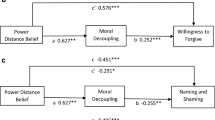Abstract
The present study examined two general research questions pertaining to the passage of a law designed to encourage whistle-blowing: (a) Has the incidence of perceived wrongdoing, whistle-blowing, anonymous whistle-blowing, or retaliation changed following the passage of the law? (b) What variables predict the comprehensiveness of retaliation that identified whistle-blowers claim to have experienced? One questionnaire was mailed to members of 15 organizations affected by the law in 1980 (n=8500) and a second was administered in 1983 (n=4700). There was some evidence that the law had beneficial effects; specifically, the incidence of perceived wrongdoing declined and whistle-blowing increased. Unfortunately, identified whistle-blowers were just as likely to experience retaliation in 1983 as they were in 1980. The predictors of the comprehensiveness of the retaliation experienced were generally the same in both years. The results tentatively suggest that more legal and organizational encouragement of whistle-blowing is needed.
Similar content being viewed by others
References
Anderson, J., & VanAtta, D. (1987, May 17). Whistle-blowers need aid.Newark (OH) Advocate, 4 A.
Dworkin, T. M., & Near, J. P. (1987). Whistle-blowing statutes: Are they working?American Business Law Journal, 25(2), 241–264.
Ewing, D. W. (1983).Do it My Way-Or You're Fired! New York: John Wiley & Sons.
Graham, J. W. (1986). Principled organizational dissent: A theoretical essay. In Staw, B. M., & Cummings, L. L. (Eds.),Research in Organizational Behavior (Vol. 8, pp. 1–52). Greenwich, CT: JAI Press.
Greenberg, J. (1987). A taxonomy of organizational justice theories.Academy of Management Review, 12, 9–22.
Greenberger, D. B., Miceli, M. P., & Cohen, D. (1987). Oppositionists and group norms: The reciprocal influence of whistle-blowers and co-workers.Journal of Business Ethics, 6, 527–542.
Hollander, E. P. (1960). Competence and conformity in the acceptance of influence.Journal of Abnormal and Social Psychology, 61, 361–365.
Jensen, J. V. (1987). Ethical tension points in whistle-blowing.Journal of Business Ethics, 6, 321–328.
Killingsworth, M. R., & Reimers, C. W. (1983). Race, ranking, promotions, and pay at a Federal facility: A logit analysis.Industrial and Labor Relations Review, 37, 92–107.
Miceli, M. P., & Near, J. P. (1984). The relationships among beliefs, organizational position and whistle-blowing status: A discriminant analysis.Academy of Management Journal, 27, 676–705.
Miceli, M. P., & Near, J. P. (1985). Characteristics of organizational climate and perceived wrongdoing associated with whistle-blowing decisions.Personnel Psychology, 38, 525–544.
Nader, R., Petkas, P. J., & Blackwell, K. (Eds.). (1972).Whistle-Blowing: The Report on the Conference on Professional Responsibility. New York: Grossman.
Near, J. P., & Jensen, T. C. (1983). The whistle-blowing process: Retaliation and perceived effectiveness.Work and Occupations, 10, 3–28.
Near, J. P., & Miceli, M. P. (1985). Organizational dissidence: The case of whistle-blowing.Journal of Business Ethics, 4, 1–16.
Near, J. P., & Miceli, M. P. (1986). Retaliation against whistle-blowers: predictors and effects.Journal of Applied Psychology, 71, 137–145.
Near, J. P., & Miceli, M. P. (1987). Whistle-blowers in organizations: Dissidents or reformers? In Staw, B. M., & Cummings, L. L. (Eds.),Research in Organizational Behavior (Vol. 9, pp. 321–368). Greenwich, CT: JAI Press.
Parmerlee, M. A., Near, J. P., & Jensen, T. C. (1982). Correlates of whistle-blowers' perceptions of organizational retaliation,Administrative Science Quarterly, 27, 17–34.
Peters, C., & Branch, T. (1972).Blowing the Whistle: Dissent in the Public Interest: New York: Washington Monthly.
Pfeffer, J., & Salancik, G. R. (1978).The External Control of Organizations. New York: Harper and Row.
United States Merit Systems Protection Board (USMSPB). (1981).Whistle-Blowing and the Federal Employee. Washington, DC: U.S. Government Printing Office.
United States Merit Systems Protection Board (USMSPB). (1984).Blowing the Whistle in the Federal Government: A Comparative Analysis of 1980 and 1983 Survey Findings. Washington, DC: U.S. Government Printing Office.
Weinstein, D. (1979).Bureaucratic Opposition. New York: Pergamon Press.
Author information
Authors and Affiliations
Rights and permissions
About this article
Cite this article
Miceli, M.P., Near, J.P. The incidence of wrongdoing, whistle-blowing, and retaliation: Results of a naturally occurring field experiment. Employ Respons Rights J 2, 91–108 (1989). https://doi.org/10.1007/BF01384940
Issue Date:
DOI: https://doi.org/10.1007/BF01384940




